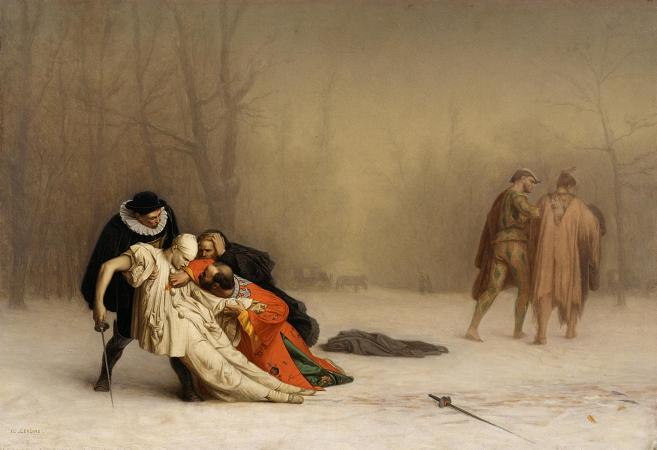Duel. A duel is an arranged engagement in combat between two people, with matched weapons, in accordance with agreed-upon rules. Duels in this form were chiefly practiced in early modern Europe with precedents in the medieval code of chivalry, and continued into the modern period especially among military officers. During the 17th and 18th centuries, duels were mostly fought with swords, but beginning in the late 18th century in England, duels were more commonly fought using pistols. Fencing and pistol duels continued to co-exist throughout the 19th century. The duel was based on a code of honor. Duels were fought not so much to kill the opponent as to gain satisfaction, that is, to restore one's honor by demonstrating a willingness to risk one's life for it, and as such the tradition of dueling was originally reserved for the male members of nobility; however, in the modern era it extended to those of the upper classes generally. On occasion, duels with pistols or swords were fought between women. Legislation against dueling goes back to the medieval period. The Fourth Council of the Lateran outlawed duels, and civil legislation in the Holy Roman Empire against dueling was passed in the wake of the Thirty Years' War.From the early 17th century, duels became illegal in the countries where they were practiced. Dueling largely fell out of favor in England by the mid-19th century and in Continental Europe by the turn of the 20th century. Dueling declined in the Eastern United States in the 19th century and by the time the American Civil War broke out, dueling had begun to wane even in the South. Public opinion, not legislation, caused the change. Research has linked the decline of dueling to increases in state capacity. Further information: Single combat In Western society, the formal concept of a duel developed out of the medieval judicial duel and older pre-Christian practices such as the Viking Age holmgang. In medieval society, judicial duels were fought by knights and squires to end various disputes. Countries like Germany, United Kingdom, and Ireland practiced this tradition. Judicial combat took two forms in medieval society, the feat of arms and chivalric combat. The feat of arms was used to settle hostilities between two large parties and supervised by a judge. The battle was fought as a result of a slight or challenge to one party's honor which could not be resolved by a court. Weapons were standardized and typical of a knight's armoury, for example longswords, polearms etc.; however, weapon quality and augmentations were at the discretion of the knight, for example, a spiked hand guard or an extra grip for half-swording. The parties involved would wear their own armour; for example, one knight wearing full plate might face another wearing chain mail. The duel lasted until one party could no longer fight back. In early cases, the defeated party was then executed. This type of duel soon evolved into the more chivalric pas d'armes, or passage of arms, a chivalric hastilude that evolved in the late 14th century and remained popular through the 15th century. A knight or group of knights would stake out a travelled spot, such as a bridge or city gate, and let it be known that any other knight who wished to pass must first fight, or be disgraced. If a traveling venans did not have weapons or horse to meet the challenge, one might be provided, and if the venans chose not to fight, he would leave his spurs behind as a sign of humiliation. If a lady passed unescorted, she would leave behind a glove or scarf, to be rescued and returned to her by a future knight who passed that way. The Roman Catholic Church was critical of dueling throughout medieval history, frowning both on the traditions of judicial combat and on the duel on points of honor among the nobility.Judicial duels were deprecated by the Lateran Council of 1215, but the judicial duel persisted in the Holy Roman Empire into the 15th century. The word duel comes from the Latin 'duellum', cognate with 'bellum', meaning 'war'. During the early Renaissance, dueling established the status of a respectable gentleman and was an accepted manner to resolve disputes. The first published code duello, or code of dueling, appeared in Renaissance Italy. The first formalized national code was France 's, during the Renaissance. By the 17th century, duelling had become regarded as a prerogative of the aristocracy, throughout Europe, and attempts to discourage or suppress it generally failed.
more...


